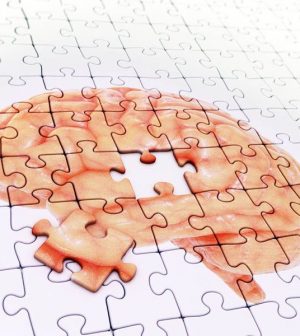- The Best Time of Day to Drink Bone Broth to Maximize Health Benefits
- 8 Ways to Increase Dopamine Naturally
- 7 Best Breads for Maintaining Stable Blood Sugar
- Gelatin vs. Collagen: Which is Best for Skin, Nails, and Joints?
- The Long-Term Effects of Daily Turmeric Supplements on Liver Health
- Could Your Grocery Store Meat Be Causing Recurring UTIs?
- Are You Making This Expensive Thermostat Error This Winter?
- Recognizing the Signs of Hypothyroidism
- 10 Strategies to Overcome Insomnia
- Could Artificial Sweeteners Be Aging the Brain Faster?
Aphasia Affects Brain Similar to Alzheimer’s, But Without Memory Loss

A rare brain disease that causes loss of language skills doesn’t lead to memory loss, a new study finds.
The condition is called primary progressive aphasia and about 40% of people who have it have underlying Alzheimer’s disease, according to researchers. Their study was published online Jan. 13 in the journal Neurology.
“While we knew that the memories of people with primary progressive aphasia were not affected at first, we did not know if they maintained their memory functioning over years,” said study author Dr. M. Marsel Mesulam, director of the Center for Cognitive Neurology and Alzheimer’s Disease at Northwestern University Feinberg School of Medicine in Chicago.
“This has been difficult to determine because most memory tests rely on verbal skills that these people have lost or are losing,” he said in a journal news release.
For the study, Mesulam’s team assessed 17 people with primary progressive aphasia associated with Alzheimer’s disease and 14 people with typical Alzheimer’s disease and memory loss.
To test memory skills, participants with primary progressive aphasia were shown pictures of common objects. Ten minutes later, they were shown the same pictures along with others and asked to choose which they had seen before.
This test was given initially and then again an average of 2.4 years later.
Meanwhile, participants with Alzheimer’s listened to a list of common words and were later given the same words along with others and asked to identify which they had heard before. They were tested initially and again an average of 1.7 years later.
Both groups also had language skills tests.
While participants with aphasia showed no decline in memory skills during the study, they had significant language-skill declines. The patients with typical Alzheimer’s, meanwhile, had equally severe declines in verbal memory and language skills.
Brain autopsies from eight of the aphasia patients and all of Alzheimer’s disease patients revealed similar amounts of Alzheimer’s-related plaques and tangles in both groups.
“More research is needed to help us determine what factors allow [people with primary progressive aphasia] to show this resilience of memory skills even in the face of considerable Alzheimer’s disease pathology in the brain,” Mesulam said.
More information
The National Aphasia Association has more on primary progressive aphasia.
SOURCE: Neurology, news news release, Jan. 13, 2021
Source: HealthDay
Copyright © 2026 HealthDay. All rights reserved.










